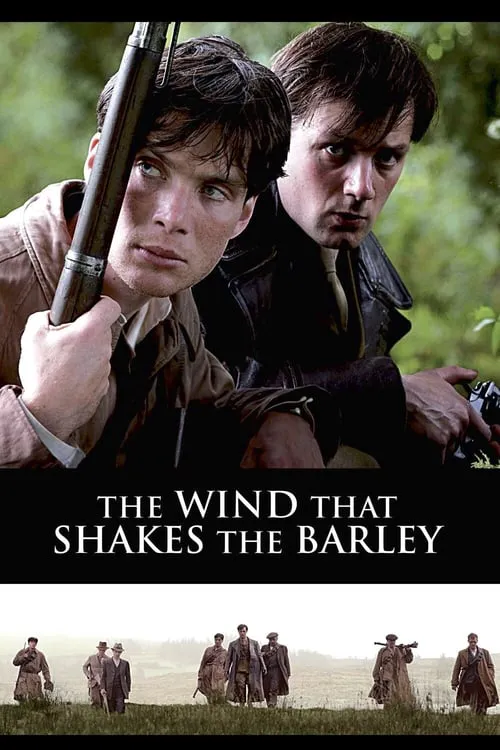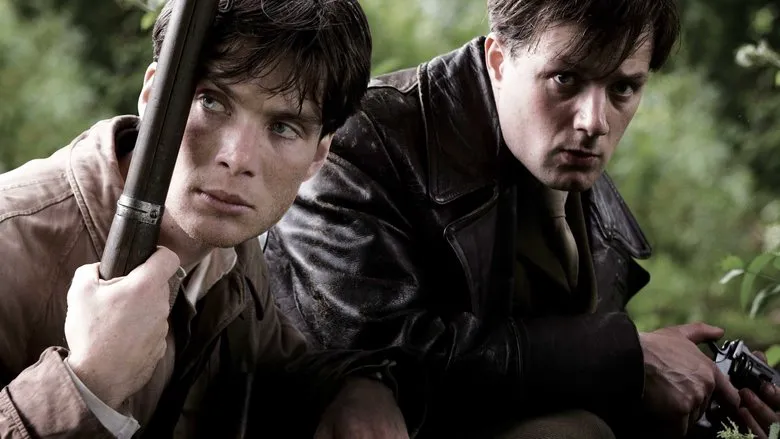The Wind That Shakes the Barley

Plot
In the 1920s, Ireland was on the cusp of a revolutionary change, struggling against the oppressive British rule that had dominated the country for centuries. Against this backdrop of strife and rebellion, the story of The Wind That Shakes the Barley unfolds, centered around the lives of two brothers, Damien and Teddy O'Donovan. The film is a powerful portrayal of the complexities of war, loyalty, and brotherly love, set against the tumultuous backdrop of Ireland's struggle for independence. The film opens with Dr. Damien O'Donovan, a young and ambitious physician who is eager to start a new life in London. As he prepares to depart for England, he spends a bittersweet evening with his friends at a remote farm in County Cork, bidding farewell to his companions and the familiar landscapes of his childhood. However, their convivial gathering is abruptly disrupted by the arrival of British Black and Tans, a notorious paramilitary unit known for their brutality and violence. The sudden appearance of the Black and Tans sets off a chain reaction of events that sets the brothers on a path of revolutionary change. Damien's older brother, Teddy, a fiery and passionate young man, is deeply involved with the Irish Republican Army (IRA), a organization dedicated to overthrowing British rule and establishing an independent Irish state. The tragic death of a young man at the hands of the Black and Tans ignites Teddy's determination to fight back against the oppressive forces that have invaded their land. As the conflict escalates, Damien, who had initially intended to maintain a neutral stance, finds himself drawn into the fray, joining his brother in the IRA. The brothers' decision to take up arms marks a turning point in their lives, as they become embroiled in the brutal and chaotic world of guerrilla warfare. The film's director, Ken Loach, skillfully captures the complexity of the human experience during wartime, weaving a narrative that is both personal and historical. Through the lens of the O'Donovan brothers, we witness the harsh realities of war, the devastating consequences of violence, and the deepening rifts that divide families and communities. As the years pass, Damien and Teddy become increasingly entrenched in the conflict, their once close bond fraying under the pressure of their opposing views. Teddy, now a seasoned guerrilla fighter, becomes increasingly radicalized, while Damien's commitment to the cause wavers as he grapples with the moral implications of his actions. Their diverging paths set off a poignant exploration of the human cost of war, where brothers, once united in their love for one another, are forced to confront the devastating consequences of their choices. Against the backdrop of this personal turmoil, the film offers a sweeping portrayal of the Irish War of Independence, with its complex array of historical figures and events. We see the iconic figure of Michael Collins, the IRA's leader, as he navigates the treacherous landscape of politics and diplomacy, seeking to bring about an independent Ireland. We also witness the brutal suppression of the IRA by the British forces, with their ruthless tactics and devastating consequences. The film's epic scope is matched by its intimate focus on the human experience. We see the toll that war takes on the O'Donovan family, including their parents, who must cope with the strain of having two sons caught up in the conflict. We witness the camaraderie and solidarity of the IRA fighters, who, despite their differences, share a common purpose and a sense of brotherhood. The performances of the cast are nuanced and compelling, with Cillian Murphy and Padraic Delaney delivering standout performances as the O'Donovan brothers. The cinematography, by Barry Ackroyd, is breathtaking, capturing the haunting beauty of the Irish countryside, the rugged landscapes, and the makeshift camps of the IRA. The Wind That Shakes the Barley is a powerful and poignant portrayal of a pivotal moment in history, a story of brotherly love, loyalty, and the enduring human spirit. Through its epic scope and intimate focus, the film reminds us of the enduring power of the human experience, where the boundaries between love, loyalty, and duty become increasingly blurred in the face of conflict and adversity.
Reviews
Recommendations





